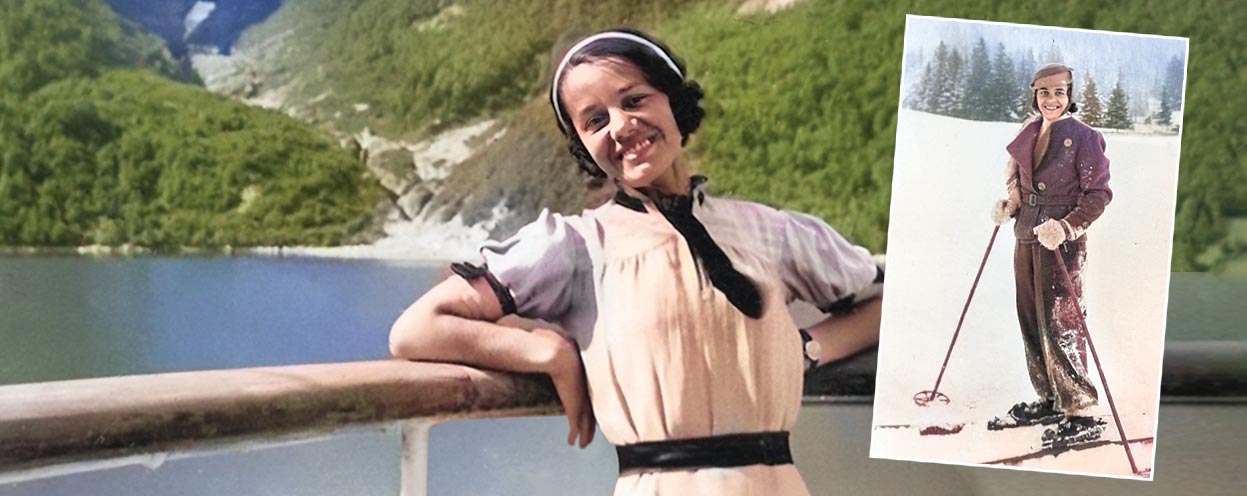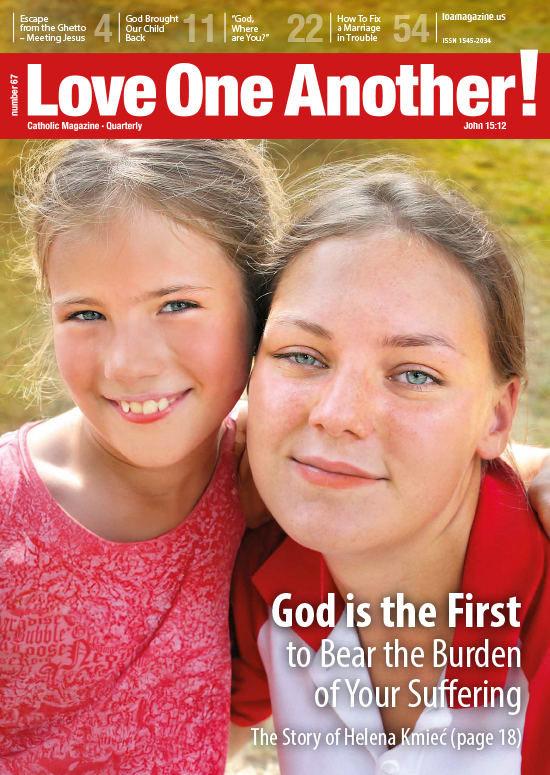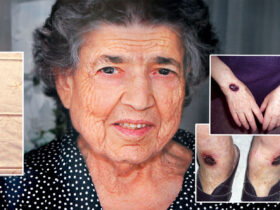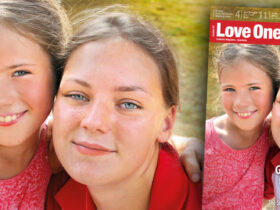It is only by Love that One Lives Life to the Fullest

“The Lord chose me for the amazing mission of love in the world, a mission which is worthy of giving one’s life for, not to mention one’s talent and strength.” This is how Bl. Natalia Tułasiewicz (pronounced too-wah-SHEV-eetch) perceived her calling in life. She was beatified in 1999, together with a group of 108 Polish martyrs, all of whom died for their faith during the Second World War.
Bl. Natalia’s example carries great hope that, no matter what the circumstances, even in extreme difficulties, our lives can be beautiful and fulfilling, and it also points to the kinds of relationships and values which help us shape this life.
Natalia was “the Lord’s apostle of love amid the world’s frenzied hatred”. Her words “God’s service is the service of strength which knows no defeat” testify to her heroic life and sealed her martyr’s death on March 31, 1945 in the German Nazi concentration camp at Ravensbruck.
I Want to Bear Christ to All People
Natalia lived for 39 years. Her father was a customs officer, and she was born into a large family in 1906 in Rzeszów, in the sector of Poland that was at the time occupied by Austria. Her upbringing and education were attentive and meticulous. She was an active member of the Marian sodality. Her youth years coincided with the first years of independence that Poland had known after 123 years of subjugation by the surrounding powers. This promoted an atmosphere of enthusiasm, which also marked her education and early years of work. While at the University of Poznan, where she majored in Polish studies, she disputed the world outlooks and the attitudes the other students supported. She planned to continue studying for her doctorate. After breaking off an engagement to a classmate, she determined to live a solitary life, convinced that solitude in the presence of God would open incredible horizons for activity.
In the twenty-year period between the wars she worked as a teacher in Poznan schools. Open to the spirit of the times and the changes, she earned the respect of others by constantly aspiring to new and more demanding challenges, both in her personal and professional life.
She expressed the sense of her life in the words: “Live as though the fate of the world depended entirely on the quality of your life”. She served people with help and support.
She was open to the events of daily life, and enthusiastic about nature, beauty, culture and art, and poetry. She felt like “a link in the chain of events and results which reach eternity”. She was hungry for knowledge, fascinated by music (she played the violin), and loving travel, sailing to Norway on the famed Polish ocean liner “Batory”, and also travelling to Rome, Assisi, and Venice. Excited at the thought of being a lay apostle, she discovered her own path to holiness. “I want to merit holiness on earth by putting effort into every day. I don’t separate the drab life from the ideals that I’m aiming for. Everything; I incorporate everything – work, study, sleep, entertainment – into my program of self-improvement”. Having her goals set high required her to constantly work on her character, to overcome egoism, and to organize her daily duties so that she would have specific time designated for prayer, work, and rest. She tried as best she could to take advantage of the abilities, opportunities, and time that God had given her.
She embraced Jesus Christ completely, in love, seeing Christ as “the image of the invisible God” (Colossians 1:15). She wrote: “I don’t go anywhere without my Most Beloved Friend”. She wanted to share Him with everyone. “I want to bring Christ … to all people, those I meet on the streets, in the trams, in offices … theaters, everywhere!”
She wrote in her journal: “I’m on fire with the desire … for Catholic-apostolic works. So I mortify myself in every sphere that makes this work easier, but I reject every mortification that would turn me away from the path designated for me by Providence. I don’t deny myself tourism, theater, movies, books, incessant studies, discussions, concerts, exhibits, or travel. … A good Christian has obligations beyond suffering… he has an equal obligation to be an example of joy”.
She dreamed of “harmonizing the culture of the soul with the culture of the body”, and declared: “I have the courage to be a saint, a modern saint, a God-centered humanist… I value and love the mundane habit of Brother Albert, but the saints in tuxedoes and ball gowns are also dear to me”. In other words we could say that she valued at a spiritual level everyone she met, no matter whether they were rich or poor, saints or sinners.
Defeat Evil with Good
In November of 1939 the nine-member Tułasiewicz family was expelled from their apartment in Poznan and transferred to a transitional camp from which they were transported to Ostrowiec Świętokrzyski in cattle cars. Thus began the dramatic struggle for the preservation of the family, and Natalia demonstrated the greatest initiative. She faced every obstacle and misfortune bravely: “at this point it’s time to get a hold of oneself, keep your head attached, and do what is necessary to endure”. She made her way to Krakow, looking for the means for her family to survive. There, she found work teaching secretly in the Ursulan center, and after a certain time, she brought her family along.
While she was engaged in the demands of secret teaching, she made academic and social contacts, and organized conspiratorial meetings of poetry and personal development. She constantly improved her own standard of expertise.
Convinced that “the greatest gift in life is the person, his good, feeling heart”, she was open to everyone. She helped her family, the needy, and the sick. She stood by her dying father and a dying friend.
She treated the period of war as a valuable albeit difficult retreat. She hoped that after the war she would be a leader of the movement to put a fresh new face, not only on Poland, but on the entire world. She wanted to be “a holy warrior for God in daily life”.
As she experienced the results of the tumult of war, Natalia noted: “People work fervently on other peoples’ massacre; hey spew hatred, a desire for revenge, to poison, and show anger, all of which would gladly rip away even eternal salvation… If we raise our generations in the ideal of revenge, it will certainly lead Europe to a third war… It seems to me that at some point it will be my obligation to warn the people of all countries, not only Poland, that nationalist fanaticism is an abyss that will drag the most beautiful values of the people into its depths”.
The times that Natalia lived in were a great test of love for one’s neighbor in heroic measure. “God sees how much difficulty the souls that want to live according to the spirit of His Gospel are enduring. Today, when hatred strikes the brain like wine, I have to struggle not to kindle this hatred, which has such a natural human foundation. The New Testament teaches us that … we are to repay evil … with good, but this runs against our instincts. The immediate animal response of using force against an encountered offense is always within us. We truly must reach for Jesus’ holiness in order to overcome this course of least resistance… We cannot live in hatred; hatred always leads to death. Live instead only in fullness and only in love” – she wrote.
She was not afraid to speak her opinions publicly. She pointed out to the Poles the necessity of a life of harmony, without any divisions, and she dreamed of a future generation that would base itself on a motto of Christian universalism.
The Mission to Forced Laborers
The most important purpose of Natalia’s life was to develop a heroic love for God, and through it, for everyone else she came into contact with – including her enemies. The outstanding testimony to this love was her willingness to travel to Germany. Ready internally to submit her life as an offering to the Lord God, and wishing to demonstrate “to people today and tomorrow that this generation, which was living through the current nightmare of the war, was not just living a hellish impulse of destruction”, she took upon herself a very risky mission for the Polish resistance movement. Under the auspices of the “Zachód” [West] underground organization, she took the basic training to be a fully authorized emissary of the Polish government-in-exile in London, as well as a lay apostle, and willingly travelled to Hannover in 1943 to the factory of the Pelikan writing instruments company, to assist the slave laborers.
She was delicately built and physically weak (she was of poor health since her childhood), but strong in spirit. Even in the extremely difficult living conditions as a worker among workers, she carried out her religious, social, and educational service in an environment endangered both by frequent Allied bombings and by the propensity for moral downfall. Her activities were documented in the letters she sent back to Poland.
The threats of war, the separation from one’s loved ones, the incessant alarms, the bombings, the deliberate demoralization of the girls and women, the hunger, the sickness – these were the daily camp conditions which brought tensions and conflicts. Natalia softened the impact of these circumstances by offering help and advice. She had the ability to carry on by deriving strength from daily prayer, and especially from reciting the texts of the Holy Mass texts in her mind every day (usually during her work) and from receiving Holy Communion in spirit. She felt an “ardent love of the Lord Jesus” and “the fiber of His heart”. She wrote to her mother that “God watches over me with such care that I feel no anxiety. I carry the Sun within myself and It illuminates me in all the difficulties of the day. If only, my Mommy, I knew how to tell you how beautiful for me every day is! It would seem nothing but drabness, but I sail off into eternity every hour, and I know that I am loved with the whole heart of Him Who loved with all His strength… I’m proud that I can bring God to these people, and that those around me feel that I live in Him”.
It was in making prayer her life, and making her life a prayer that she fulfilled her dream. Every day, often in the air-raid shelters, she prayed with the workers, gave religion classes, explained the Commandments, the sacraments, and the truths of the faith. The women called her “the apostle”, or “the priestess”, and did their best to show their gratitude. They especially enjoyed it when she read books to them (among them the Polish classic Pan Tadeusz) and wrote stories and poems for special occasions. As she spoke German, French, and a bit of Italian, she also ministered to the slave laborers from other countries. She was gladdened with the thought that after the war she would have friends all over Europe.
People attributed the survival of the barracks in the midst of the horrific bombings of Hannover only to her confident vocal prayer. The barracks were hit by incendiary bombs, but they managed to extinguish the flames. The heartrending view of Hannover after the bombings caused her to write to her sister that: “there is something that tears at the heart when you think of what people are capable of in the 20th century. We have not advanced far beyond the times of Nero, but the guilt is greater, because the awareness of the evil is obvious… Here where we all toil enormously, where I hear and see so much, I could have become a nationalist extremist, but I didn’t. The universal and deeply humanitarian ideals that I loved the most are living even a fuller life within me”.
Despite Being Tortured, She Betrayed No One
In April of 1944 after being carelessly contacted by a courier from Poland, Natalia was arrested. The cell where she was detained in the Gestapo jail in Cologne was big enough for one person, but five women were incarcerated there. Even in such extremely difficult conditions (absolutely no time outside the cell, stuffiness, hunger, scabies, and lice) she did not give up her testimony to the faith. She was interrogated, tortured, and beaten till she bled, but she didn’t betray anyone.
In September of 1944 she was sent from Cologne to Ravensbrück with a death sentence. Despite being exhausted by hunger, hard work at the airport, and the return of her tuberculosis, she never diminished her mission to evangelize. She prayed with the other inmates, and led services and theological discussions. Her patriotism for Poland emanated from her very being as she helped the younger women prepare for their exams. Moved by the enormity of the suffering around her, she composed poetry, which she would then recite as she lay in the barracks for the sick.
As the war was winding down the Nazis gassed the weakest of the inmates on a mass scale. Natalia was prepared internally to offer her life for God, and even though she dreamed of working as an apostle and author after the war, she didn’t want to hide and was totally submitted to God’s will. On Palm Sunday, with the last of her strength she organized services for the beginning of Holy Week to honor the Lord’s Passion. On Good Friday, March 31, 1945 at the morning role call she was forced to walk in front of a gauntlet of Nazis. Taking her by the hands, two of the junior high school girls tried to help the exhausted Natalia, but the executioners beat them away and poked a rod through Natalia’s dress. She was taken into the gas chamber, where she died immediately afterwards. This was the last Good Friday of her life. What a fitting day to die for Christ! On Holy Saturday as the Germans demolished the chimney of the crematorium, the allies and the Russians were already at the gate of the camp.
It’s been more than 70 years since Natalia boldly proclaimed that “today’s times and those that we’re headed for open a new epoch of activity for lay people and for the laicization of evangelization”. In today’s reality we discover in Natalia’s example that the most important method of evangelization is the testimony of one’s own life. We can see in our own complicated reality how badly the world needs witnesses to Jesus Christ who want to bring hope to all people, from various cultures, nationalities, and creeds, and are not afraid to discuss the faith with non-believers. Bl. Natalia wrote that “One lives fully only in love”. She lived that fullness of life because “prayer became her life and her life became prayer”. She carried on, accompanied by her “Most Beloved Friend” Jesus Christ, fulfilling his will; even to a martyr’s death.
Source:
HYPERLINK “http://www.blogoslawionanatalia.eu” www.blogoslawionanatalia.eu






